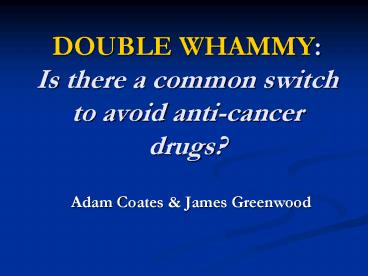DOUBLE WHAMMY: Is there a common switch to avoid anticancer drugs - PowerPoint PPT Presentation
1 / 12
Title:
DOUBLE WHAMMY: Is there a common switch to avoid anticancer drugs
Description:
Be able to explain how this leads to Multidrug Resistance ... 3) Starling JJ, Shepard RL, Cao J, et al. Pharmacological characterization of ... – PowerPoint PPT presentation
Number of Views:77
Avg rating:3.0/5.0
Title: DOUBLE WHAMMY: Is there a common switch to avoid anticancer drugs
1
DOUBLE WHAMMY Is there a common switch to avoid
anti-cancer drugs?
- Adam Coates James Greenwood
2
AIMS OBJECTIVES
- Understand the functions of P-gp and P450
- Understand Double Whammy effect of chemotherapy
- Be able to explain how this leads to Multidrug
Resistance - Be aware of the problems encountered with using
P-gp inhibitors - Understand the therapeutic benefits of 3rd
generation drugs
3
P-Glycoprotein (Pgp)
- ATP-dependant efflux drug transporter.
- Expressed in normal tissues- GI epithelium
-
Canicular
membrane of liver -
kidney -
Capillary
endothelial cells in CNS - Broad substrate specificity.
- Plays a key role in absorption, distribution,
elimination of many drugs.. - including ANTICANCER AGENTS!
4
Cytochrome P-450 (CYP)
- Mixed-function monooxygenase enzyme.
- 500 amino acids and a hæm group at the active
site. - More than 6000 distinct cytochrome P450
sequences are known and officially named. - CYP3A is the primary subfamily responsible for
phase 1 metabolism of gt50 of drugs administered
to humans (Benet et al, 1996a). - CYP3A4 most prominent CYP in humans. 30 of
CYPs liver - 70 of CYPs intestine
- Has broad substrate specificity, inc. many
chemotherapy agents.
5
DOUBLE WHAMMY!
- Chemotherapy treatment has been proved to CAUSE
an UPREGULATION of P-gp AND P450. - An inherent defence mechanism - useful when
dealing with standard toxic chemicals, but
counterproductive in chemotherapy - P-gp (MDR1) gene expression can be rapidly
activated in human tumours after transient in
vivo exposure to cytotoxic chemotherapy. - In a study of sarcoma pulmonary metastases, a
3-15 fold increase in MDR1 RNA expression, was
observed after lung perfusion with doxorubicin,
AFTER 50 MINS!! (1)
6
Why this is bad
- Means Chemotherapy is becoming ineffective as
the course of treatment progresses. - Greater P-gp efflux cellular level
- Greater p450 metabolism - systemic level
- Multi Drug Resistance developing
7
P-gp inhibitors
- Need to inhibit P-gp pumps. I.e. keep drug in the
malignant cell. - Clinically not as simple as that
- 1980s- Early (1st generation) drugs e.g.
Cyclosporin, verapamil. Non-spec to p-gpToxic
levels! - 2nd generation e.g. Valspodar, Biricodar. More
potent, less toxic - But
8
BUT
- The genes of the P-gp and p450 families share
overlapping regulatory elements - Infact, many of the cytotoxic agents that are
substrates for P-gp are also substrates for the
p450 isoenzyme 3A4 - Therefore you also get inhibition of
p450-mediated metaboism - Can lead to SYSTEMIC TOXICITY.
- OR- lack of activation of chemotherapy drugs
9
Whats The Answer Then?
- Need a drug which balances therapeutic effects
with those of potential toxicity. Therefore,
ideally targeting the inhibition of Pgp, with
minimal inhibition of CYP3A - Studies have shown that 3rd generation P-gp
inhibitors- - Specifically and potently inhibit P-gp function
- And yet dont affect CYP3A4 at relevant
concentrations - Therefore, chemotherapy doses DONT need to be
reduced.
10
Clinical Trials 3rd generation
- Tariquidar (2) Zosuquidar (3)
Laniquidar (4) - Trials show can be given with full therapeutic
doses of cytotoxic agents, with minimal
interference with of the pharmokinetics of the
cytotoxic agents - This approach should avoid MDR and improve the
prognosis for cancer patients. - Preliminary results offer new hope that this goal
might be achieved
11
Summary
- Anticancer drugs not only target neoplastic
cells, they also up-regulate the expression of
the ABC transporter, P-glycoprotein. The
consequence of this is that neoplasm become MDR
as the ABCB1 is able to efflux chemotherapeutic
agents. At the same time the Cytochrome P450
enzymes are also up-regulated, so that overall
not only is the drug being removed from cells, it
is also being metabolised and subsequently
eliminated producing a DOUBLE WHAMMY inhibition
on the action of anti-cancer drugs. - Where research has gone looking to drugs to
co-administer with chemotherapeutic agents, which
will inhibit the effects of P-gp and not have a
dual inhibition on the action of cytochrome
p450Drugs have been found - BUT the long term effects are not known, as
trials are still going on.. - FUTURE Gene therapy identifing the gene, which
controls expression of Pgp by neoplasm and
modifying expression so that rather than cancers
expressing the gene, surrounding normal cells
do!!!
12
References
- 1) Abolhoda A, Wilson AE, Ross H, et al. Rapid
activation of - MDR1 gene expression in human metastatic
sarcoma after in vivo - exposure to doxorubicin. Clin Cancer Res.
199953352-3356. - 2) Roe M, Folkes A,Ashworth P, et al. Reversal of
P-glycoprotein - mediated multidrug resistance by novel
anthranilamide derivatives. - Bioorg Med Chem Lett. 19999595-600
- 3) Starling JJ, Shepard RL, Cao J, et al.
Pharmacological characterization of LY335979 a
potent cyclopropyldibenzosuberane modulator of
P-glycoprotein. Adv Enzyme Regul. 199737335-347 - 4) van Zuylen L, Nooter K, Sparreboom A, et al.
Development of multidrug-resistance convertors
sense or nonsense? Invest New - Drugs. 200018205-220.
- Papers used extensively-
- Hilary Thomas, MA, FRCP, FRCR, PhD, and Helen M.
Coley, PhD Overcoming Multidrug Resistance in
Cancer An Update on the Clinical Strategy of
Inhibiting P-Glycoprotein.Cancer control Journal
of the Moffitt cancer centre. - Christoph Wandel, Richard B. Kim, Shama Kajiji,
F. Peter Guengerich, Grant R. Wilkinson and
Alastair J. J. Wood. P-Glycoprotein and
Cytochrome P-450 3A Inhibition Dissociation of
Inhibitory Potencies.































